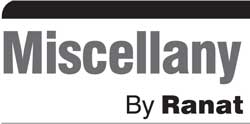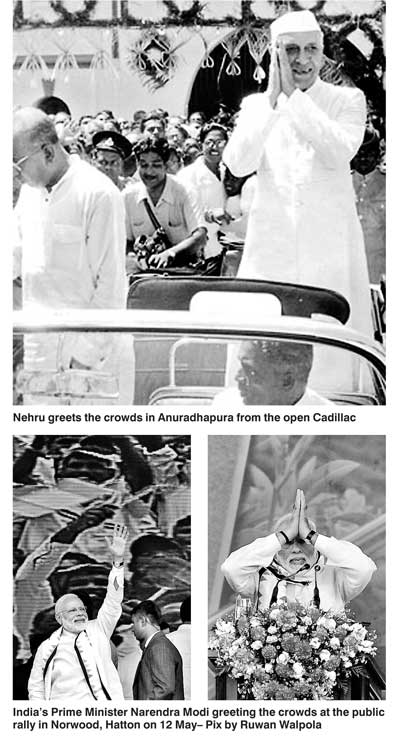Tuesday Feb 17, 2026
Tuesday Feb 17, 2026
Saturday, 20 May 2017 00:00 - - {{hitsCtrl.values.hits}}
May 1957 – Indian Prime Minister Shri Jawaharlal Nehru arrives in Sri Lanka to participate in the Buddha Jayanthi celebrations. Goes to Anuradhapura by special train. Opens Jayanthi Mawatha to mark the Buddha Jayanthi and addresses the gathering. Spends time on his own at the Samadhi Buddha statue, which he admitted had brought him solace when he was in prison.
May 2017 – Indian Prime Minister Narendra Modi arrives in Sri Lanka to open the UN Vesak celebrations at the BMICH. After addressing the local/international audience, he leaves by helicopter to meet the upcountry plantation community. Opens Dikoya hospital and gets to Kandy to pay homage to Sri Dalada. 
On 18 May 1957, I accompanied Nehru’s entourage to Anuradhapura by train as a news reporter of the Dinamina. Media – almost solely newspaper reps – were allowed to remain close to Nehru on stage with no fuss by security personnel. We hardly noticed any. Times were so different.
One time journalist, Junior Minister (as Deputy Ministers were then called), Nimal Karunatilleka (he was a colleague of mine at Peradeniya campus) jotted down notes to translate Nehru’s speech. Being 60 years ago, I really cannot remember what he said. He would certainly have spoken of the Buddha’s teachings, the occasion being the closing celebrations of the 2,500th anniversary of the passing-away of the Buddha.
Being UNB Vesak celebrations, Prime Minister Modi’s address at the BMICH naturally revolved round what Buddha’s message means to the world today.
“Lord Buddha’s message is as relevant in the 21st century as it was two and a half millennia ago. The Middle Path shown by Buddha, speaks to all of us. Its universality and evergreen nature is striking. It has been a unifying force among nations. The countries of South, Central, South East and East Asia are proud of their Buddhist links traced to the land of Buddha,” he said.
Stressing that the themes of social justice and sustainable world peace, chosen for the Vesak day, resonate deeply with Buddha’s teachings, he pointed that the issue of social justice is linked to conflict within and among communities. “This arises principally because of the thirst, which in turn stems from greed. Greed has driven the mankind to dominate and degrade our natural habitat. Our desire to achieve all our wants has created income inequalities in communities and disturbed social harmony.”
He pointed out that the biggest challenge to sustainable world peace today may not be necessarily from conflict between the nation states but from the mindsets, thought streams, entities and instruments rooted in the idea of hate and violence. “The menace of terrorism in our region is a concrete manifestation of this destructive emotion. Sadly, these ideologies of hate and their proponents in our region are not open to dialogue and hence only open to causing death and destruction.”
He emphasised that he firmly believes that Buddhism’s message of peace is the answer to growing arc of violence all over the world. And, not just a negative notion of peace defined by the absence of conflict. But, a positive peace where we all work to promote dialogue, harmony and justice, based on compassion and wisdom. As Buddha said, “there is no higher bliss than peace”.
Shri Nehru admitted that he was deeply influenced by one religious figure, in whose teachings he often found intellectual solace – the Buddha. “The story of Gautam Buddha has influenced me from my childhood. That influence was two-fold. First, it influenced me as a story and secondly, I liked the scientific attitude reflected therein, the scientific and ethical attitude.”
This statement is displayed on one of the large placards at an exhibition on ‘Lord Buddha through the eyes of Jawaharlal Nehru’ at Nehru Museum and Library.
Another reads: “I thought of his message which apart from its religious significance was a message of tolerance, a message against superstition, rituals and dogma. It was a message essentially in scientific spirit. The Buddha asked no man to believe in anything except what could be proved by experiment and trial. All he wanted men to do was to seek the truth and not accept anything on the word of another even though it be of Buddha himself. That seems to me the essence of his message…”
In the UN General Assembly, on 3October 1960, Nehru said, “In ages long past a great son of India, the Buddha, said that the only real victory was one in which all were equally victorious and there was defeat for no one. In the world today that is the only practical victory; any other way will lead to disaster.”
It has been recorded that Nehru never failed to visit Samadhi Statue of the Buddha at Anuradhapura whenever he went there. He first visited there in 1931 and followed it up by visits in 1939, 1954, 1957 and 1962.